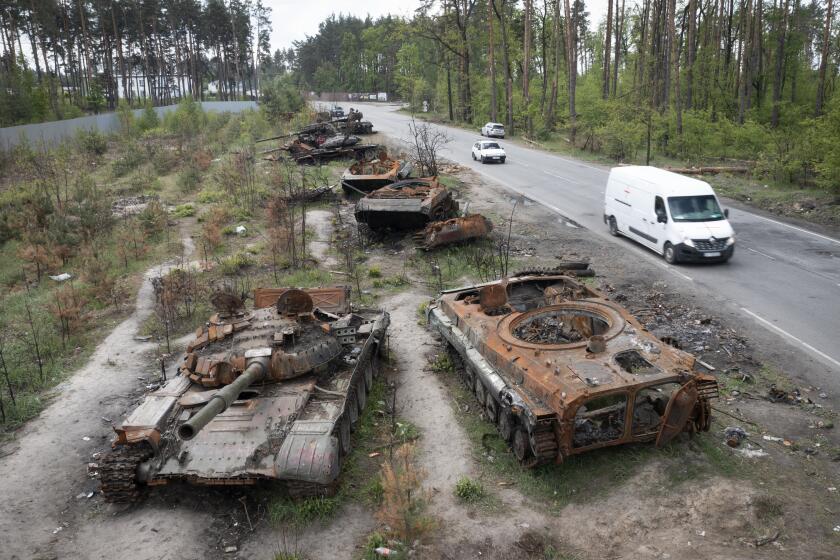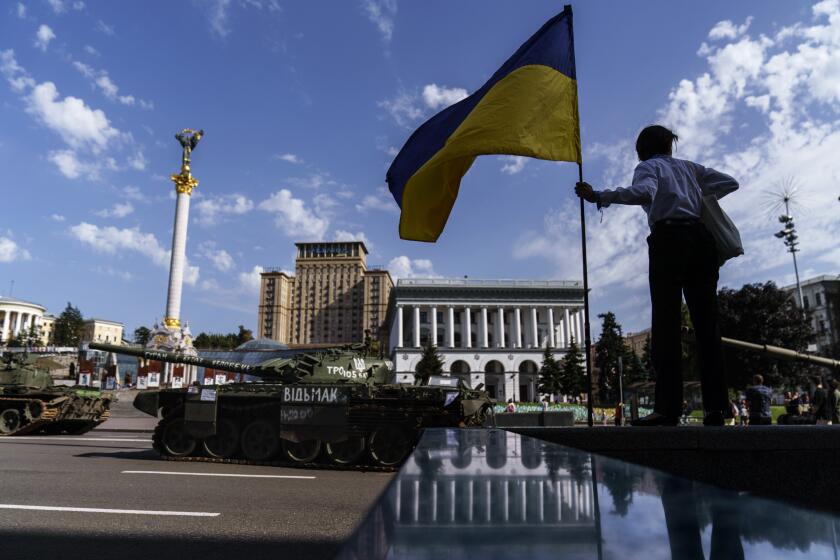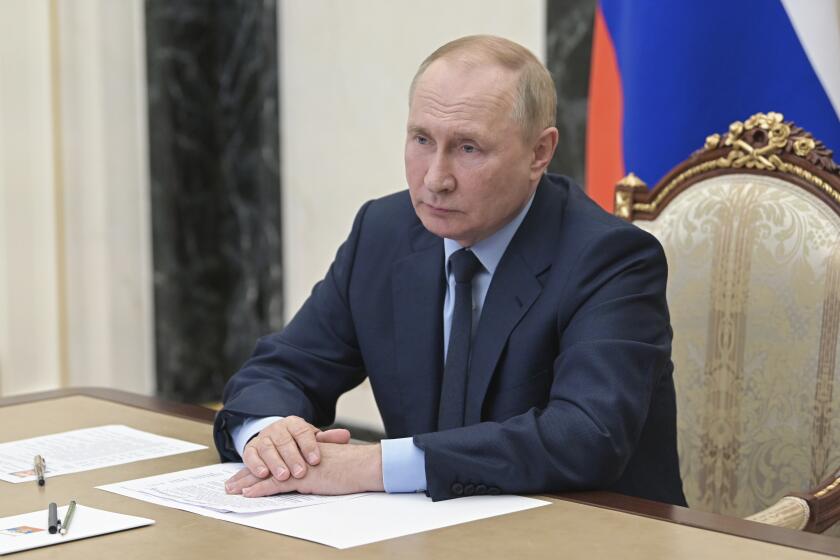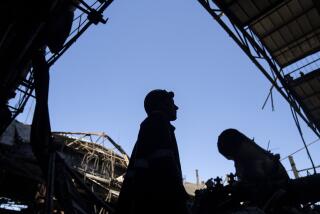Fears of a radiation leak mount near Ukrainian nuclear plant
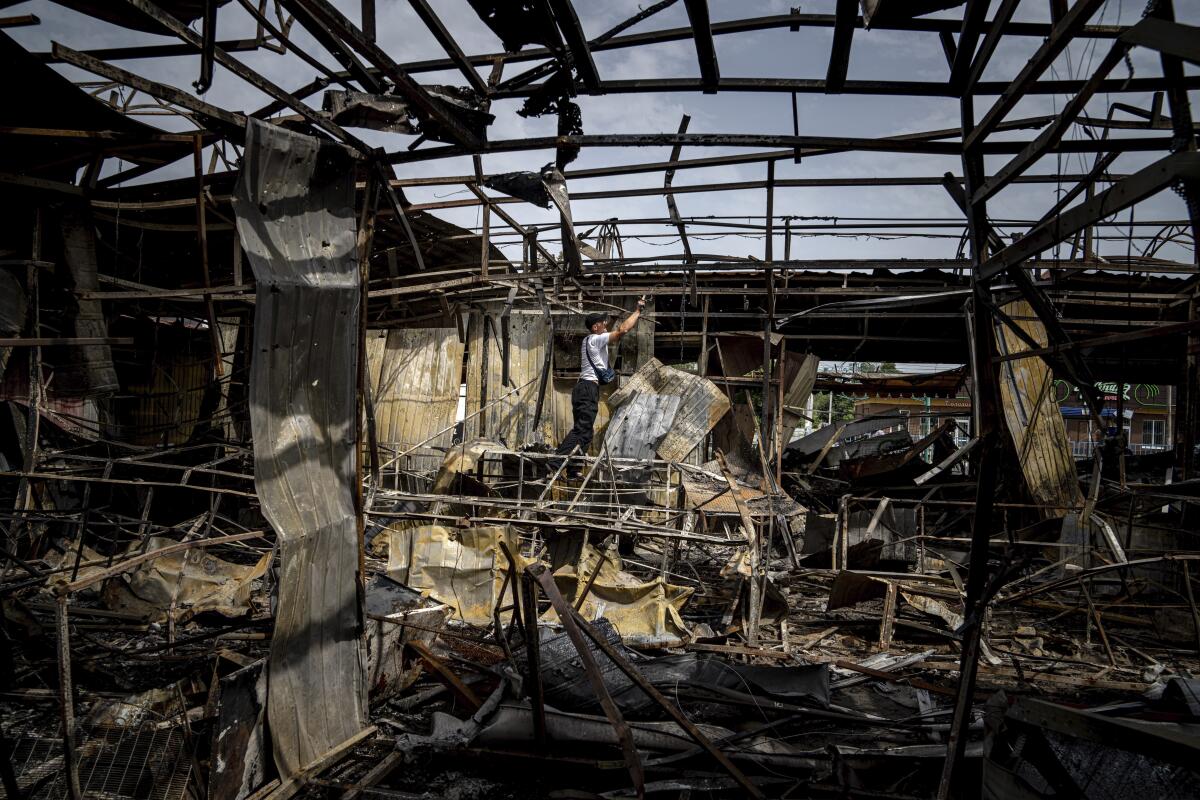
- Share via
KYIV, Ukraine — Authorities began distributing iodine tablets to residents near Ukraine’s Zaporizhzhia nuclear power plant Friday in case of a radiation leak amid mounting fears that the fighting around the complex could trigger a catastrophe.
The move came a day after the plant was temporarily knocked offline because of what officials said was fire damage to a transmission line. The incident heightened dread of a nuclear disaster in a country still haunted by the 1986 explosion at Chernobyl.
Continued shelling was reported in the area overnight, and satellite images from Planet Labs showed fires burning around the complex — Europe’s biggest nuclear plant — over the last several days.
Iodine tablets, which help block the absorption by the thyroid of radioactive iodine that could be released in a nuclear accident, were issued in the Ukrainian-controlled city of Zaporizhzhia, about 27 miles from the plant. A woman and her small daughter were among those receiving the pills.
The United Nations’ atomic energy agency has been trying to send in a team to inspect and help secure the plant. Officials said preparations for the trip were underway, but it remained unclear when it might take place.
The Zaporizhzhia plant has been occupied by Russian forces and run by Ukrainian workers since the early days of the 6-month-old war.
A Russian paratrooper has self-published an explosive memoir about his experiences in Ukraine. But not everyone considers him a hero for doing so.
In Thursday’s incident, Ukraine and Russia blamed each other for the transmission-line damage that knocked the plant off the power grid.
Exactly what went wrong was not clear, but Ukrainian President Volodymyr Zelensky said the plant’s emergency backup diesel generators had to be activated to supply electricity to operate the complex.
The plant requires power to run the reactors’ vital cooling systems. A loss of cooling could lead to a nuclear meltdown.
Ukrenergo, Ukraine’s electricity system operator, reported Friday that two damaged main lines supplying the plant with power had resumed operation, ensuring a stable supply.
Far from bogging down in a stalemate, Russia’s invasion of Ukraine presents new perils after six months, including the threat of a nuclear disaster.
The country’s nuclear power agency, Energoatom, said the plant had been reconnected to the grid and was producing electricity “for Ukraine’s needs.”
“The nuclear workers of Zaporizhzhia power plant are real heroes! They tirelessly and firmly uphold the nuclear and radiation safety of Ukraine and the whole of Europe on their shoulders and work selflessly so that their native country has life-giving electricity,” the company said in a statement.
The Russian leader wants the country’s armed forces to expand by 137,000 troops amid Moscow’s military action in Ukraine.
Russia-installed officials in the Zaporizhzhia region, however, said the plant was supplying electricity only to Russia-controlled areas of the country and not to the rest of Ukraine.
Concerns about the plant have reverberated across Europe.
French President Emmanuel Macron said a visit by the U.N.’s International Atomic Energy Agency should be allowed to take place “very quickly,” warning, “Civilian nuclear power must not be an instrument of war.”
Lana Zerkal, an advisor to Ukraine’s energy minister, told Ukrainian media that the logistics for a U.N. visit were still being worked out. Zerkal accused Russia of trying to sabotage the visit.
Breaking News
Get breaking news, investigations, analysis and more signature journalism from the Los Angeles Times in your inbox.
You may occasionally receive promotional content from the Los Angeles Times.
Ukraine has claimed Russia is using the plant as a shield by storing weapons there and launching attacks from around it.
Moscow, for its part, accuses Ukraine of recklessly firing on the complex.
Zaporizhzhia’s reactors are protected by thick, reinforced concrete containment domes that experts say can withstand an errant artillery shell.
Many of the fears center instead on a possible failure of the cooling system, and also the risk that an attack on the cooling ponds where spent fuel rods are kept could scatter radioactive material.
Continued Russian shelling of Nikopol, a city across the Dnieper River from the nuclear plant, damaged 10 houses, a school and a healthcare facility but caused no injuries, said Dnipropetrovsk Gov. Valentyn Reznichenko.
More to Read
Sign up for Essential California
The most important California stories and recommendations in your inbox every morning.
You may occasionally receive promotional content from the Los Angeles Times.
